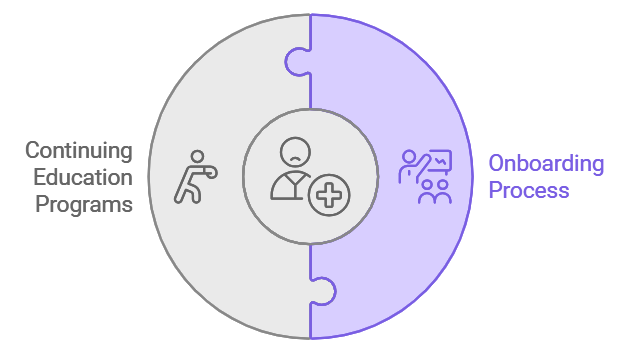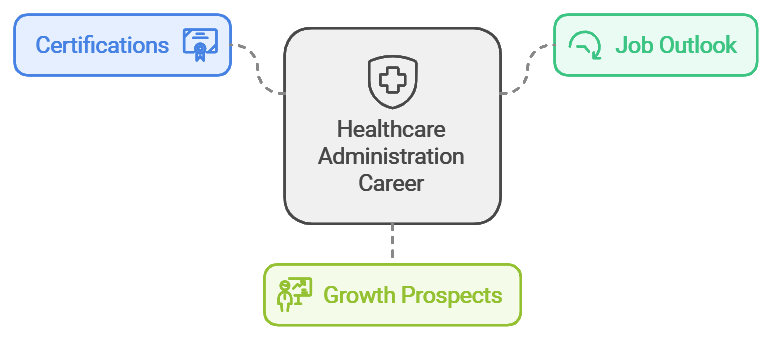Building Your Administrative Team
Starting your admin squad is vital for running a medical practice smoothly. Knowing what each team member is supposed to do and the skills needed are super important for keeping things efficient and caring for patients properly.
Roles and Responsibilities
- Medical Billing and Insurance Tasks: Juggling medical billing and insurance in a practice isn’t easy. It involves coding for diagnoses and treatments, insurance claims, and collecting payments. Keeping claims processed right, sticking to coding rules, and sorting out payments quickly are big responsibilities in this area.
- Human Resources Management: Human resources are the backbone of any medical office. Managers must hire and train staff to ensure everyone is competent and the office runs like a well-oiled machine. This directly affects how patients are treated.
- Staff Concerns Handling: When it comes to staff issues, medical office managers have to manage complaints, settle disputes, provide needed resources, and create a positive work vibe. They’re like the peacekeepers and cheerleaders rolled into one.
Essential Skills for Success
- Compliance Management: Complying with health rules and setting up compliance protocols are big deals. Regular training and keeping office procedures up to date are also important parts of following regulations.
- Billing and Claims Oversight: Critical tasks include overseeing billing, ensuring accurate services are billed to patients, and handling insurance claims smoothly. You need an eye for detail, thoroughness, and good follow-up skills to fix billing snafus.
Having an administrative team that understands these roles and brings the right skills to the table will help your medical practice run effectively. By focusing on both these roles and the necessary skills, you can grow a team ready to tackle the hectic world of medical practice operations.
Training Strategies

Training is like a secret sauce for administrative folks working in medical practices. It’s all about picking up the skills and smarts to run the place like a well-oiled machine. Two solid training plans really matter to whip up a top-notch crew: the warm welcome and the never-ending learning gig.
Onboarding Process
The onboarding process is a crucial step for new team members. It’s a comprehensive introduction to the medical world, providing them with the knowledge and skills they need to succeed. By mastering the ropes, rules, and responsibilities, they can quickly become an integral part of the team, ready to contribute to the practice’s success.
Here’s what should happen during onboarding:
- Meet the team and see how the place fits together.
- Learn the tricks of the trade, like sorting out patient scheduling and the daily grind.
- Get a hang of the tech stuff they’ll be using.
- Know how to deal with patient questions.
- Get the lowdown on keeping everything private and tick off that HIPAA training.
- Brush up on how to deal with meds.
When everything is clearly laid out, newbies settle quicker into their roles and become stars in the practice play.
Continuing Education Programs
Once onboard, the learning journey continues. Ongoing education is a key part of keeping the team sharp and up-to-date with the latest developments in healthcare. It’s an opportunity to learn new skills, stay informed about industry trends, and ensure everyone is following the rules. By participating in these programs, the team can stay ahead of the curve and be prepared for any challenges that come their way.
Here’s what these education programs need:
- Snazzy workshops that amp up skills beyond the basics.
- Training for the latest gadgets and software shaking up medical operations.
- Courses that polish speaking skills and build those people skills (interpersonal skills).
- Classes on knowing healthcare regs and sticking to the rules, like HIPAA.
- Tailored programs for the frontline faces—the reception and office squads (training programs for healthcare receptionists).
Getting staff involved in these programs regularly ensures that the whole team stays a step ahead, ready for whatever the healthcare world throws at them. Keep the education train rolling, and practices will have a squad ready to take on anything.
Efficient Practice Operations
Running a medical practice smoothly requires some serious knack for handling two biggies: patient scheduling and embracing tech to jazz up the daily routine.
Patient Scheduling
Nailing the patient scheduling puzzle can get your practice humming. Doctors’ offices juggle quite a bit here—scheduling fresh faces and familiar ones, gathering all that patient and insurance intel, ensuring everyone’s appointments are locked in, and tossing in an online scheduling option. Now, that’s a game-changer (DemandHub).
No-shows and tardy patients are the doctor’s headache. Reminders from an online scheduling system can be a lifesaver, nudging patients about their appointments and making sure everyone’s on the same page.
And how about a waitlist feature? It’s a wizard that fills those last-minute openings when someone cancels or doesn’t show up. This helps ensure providers are busy healing folks, not twiddling their thumbs.
Use of Technology in Operations
Dipping into tech land can revamp how things roll at your medical practice. With Electronic Health Record (EHR) software at your fingertips, you’re talking sleek operations with instant booking, auto reminders, and quick re-scheduling – all perks that make patients smile, trim down those pesky queues and keep the schedule tight.
Plus, you’ve got data at your fingertips. EHR software doesn’t just let appointments happen – it maps out trends, cancellation habits, and the dreaded no-show stats. This paints a clear picture for practice managers to tweak things, from resource use to patient engagement, ensuring the whole place runs like a well-oiled machine.
By sharpening their scheduling skills and embracing tech, medical practices can up their game, make patients’ lives easier, and make the best use of every ounce of resource. Bringing in modern scheduling gear and tech-smart tools sets the stage for a healthcare scene where everything just clicks.
Career Development in Healthcare Administration

Choosing to work in healthcare administration is like opening a treasure chest full of options to boost your career and gain some impressive credentials. Think of it as a way to turbocharge your skills and knowledge while paving the road for career growth.
Certifications and Advancement Opportunities
- Fellow of the American College of Healthcare Executives (FACHE) Certification: This one’s for those aiming high in healthcare management. If you’re eyeing fields like IT, finance, or operations, the American College of Healthcare Executives offers this certification. It’s a badge of honor to show your chops in healthcare management and your commitment to making strides in the industry.
- Certified Medical Manager (CMM) Certification: Talk about getting your ducks in a row! The Professional Association of Health Care Office Management thinks of CMM as the gold star for healthcare office managers with the smarts and the know-how to juggle medical practices. Think of it as a rite of passage, with a massive 200-question multiple-choice exam touching on 18 parts of medical practice.
- National Certified Medical Office Assistant (NCMOA) Certification: This one is the cherry on top for those wanting to boost their job prospects. It’s not a must-have, but boy, does it help! Offered by the National Center for Competency Testing, the NCMOA gives you a leg up if you’ve got a relevant diploma plus a year of work experience under your belt. Expect a 150-question test to prove you’ve got what it takes in medical office assisting (Concorde Career Colleges).
Job Outlook and Growth Prospects
For those clocking in as medical office administrators, expect the typical 40-hour workweek, with the possibility to hustle for some extra hours if you’re up for it. From 2022 to 2032, the demand for those running the show behind the scenes is looking to skyrocket by 14%, outpacing most other gigs, which are about 3% growth. An aging baby boomer bunch is the primary driver here, and they need savvy folks to keep things rolling smoothly in healthcare.
So, with this smorgasbord of certifications and a sunny job outlook, it’s all about stacking the deck in your favor for a meaningful career in healthcare administration. Snap up those certifications, dive into growth opportunities, and you’ll likely find yourself in a rewarding role in making a difference in medical practice operations.
Effective administration is the backbone of a thriving medical practice. Optimize your team’s roles and streamline operations for better patient care and efficiency. Transform Your Practice Now! Contact Karma Health for tailored strategies to enhance your administrative team’s performance and elevate your practice.




